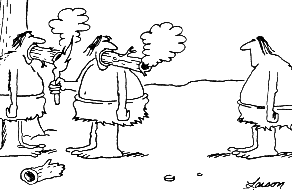Developing knowledge about the
physical world takes a tremendous amount of time
A scientist may spend years or decades
studying some specific aspect of rocks, hydrocarbons, or transistors before
he has anything valuable to say about the issue. By comparison, the majority
of people spend only a few moments contemplating abortion, crime, and the
bombing of Iran's nuclear facilities, but after their brief and superficial
analysis, they believe that they have devised the final solution to these
complex problems.
Most people realize that it takes a lot of effort and intelligence to
develop knowledge about the physical world, but the common attitude is
that it's so easy to develop intelligent opinions about social issues that
everybody's opinion is worth listening to.
Television news crews in America sometimes take this to such an extreme
that they ask children for their opinions on the Iraq war or the presidential
candidates, but this is as ridiculous as asking children for their opinions
about the latest X-ray diffraction photographs.
If humans were as complicated as rocks or transistors, then it would
take as much talent, time, and effort to come up with something intelligent
to say about humans as it does about those other items. However, humans
are much more complicated, so it should
take even more talent, more time, and more effort. Therefore, there should
be even fewer people who have something
intelligent to say about human life.
Not surprisingly history proves this to be the case. There are thousands
of people throughout history who were capable of developing knowledge about
the physical world, but there is hardly anybody who has written something
truly intelligent about human life.
"They're just words on paper.
I can do that, also!"
When Mozart wrote a song, most of his time was spent creating
the tune, not writing the music symbols on paper.
Likewise, when a scientist writes a scientific report about iron or
benzene, most of his time was spent on the research
and analysis of the subject matter,
and only a small amount of time was spent converting the results of his
analysis into a written document.
Musicians and scientists do most of their work inside their mind,
and after the work is finished they put the results into a document. By
comparison, a carpenter or car mechanic does only a small amount of his
work in his mind; he does most of his work with his hands.
When we look at the work of a talented carpenter, we can easily understand
that he spent a lot of time and effort to create it, and we can clearly
see that he has a lot of talent. By comparison, when we look at the work
of a scientist or music writer, all we see are sheets
of paper. It's easy for someone to think,
 |
“Hey, I know how
to use a pencil. Therefore, I can write opinions about life, also. It's
easy to write!” |
Most people believe that it's easy to create intelligent opinions
about abortion, war, taxes, election systems, and immigration. However,
to create something useful about the human social world requires a tremendous
amount of time, effort, talent, and intelligence.
A more realistic attitude is that information about humans is "social
technology", and that the information about iron or aircraft
is "physical technology".
What is "physical technology"?
Technology can be considered as lists of instructions
on how to manipulate items to create something new. Technology is like
a recipe on how to bake a cake. For
example, our technology on how to create iron from iron ore is a set of
instructions on how to build a furnace, how to identify rocks that have
high levels of iron, and what type of fuel to burn. After this list of
instructions has been developed, anybody with moderate intelligence is
capable of following the instructions and creating iron.
Centuries ago the instructions on how to create iron were very simple,
and the resulting iron was very crude. However, thousands of people around
the world have been studying this technology and refining it. Today we
have very detailed instructions on how to make iron.
The technology that allows us to create integrated circuits is also
a set of instructions. This list shows us how to create silicon wafers
and how to put transistors and other devices onto the wafer.
Creating technology is difficult,
following the instructions is easy
Only a small number of people can create music that people
enjoy so much that they pass it from one generation to the next. However,
as soon as some talented musician puts his music on paper, even people
with mediocre talent will be able to read the notes and create the music.
Likewise, only a small percentage of the human population is capable
of figuring out how to make integrated circuits, nuclear bombs, and robots.
However, once those instructions are created, a lot of people are capable
of following them, thereby giving them the ability to produce items that
they don't have the ability to create on their own.
There is no harm in dispersing music throughout the world, but it is
dangerous to give people weapons, chemicals, robots, and other technology
that they don't know how to handle.
What is knowledge?
Our knowledge about iron is our observations on how iron reacts
to carbon, silicon, oxygen, and other items at different temperatures,
pressures, and magnetic fields. Knowledge about iron could be described
as the "behavioral characteristics" of iron.
Every element reacts to other elements in a specific, predictable manner.
Sodium will always react to chlorine in the same predictable manner, and
iron will always react to carbon in the same predictable manner.
Our knowledge about iron, sodium, and other items allows us to create
lists of instructions on how to manipulate those items. As long as we can
control all aspects of the reactions, we can set up factories to force
certain reactions to occur, thereby manipulating the items to create products.
Another way to describe knowledge is that knowledge is our observations
of how items react with each other. We don't know that something exists
until it reacts with something else. All we see are the reactions. When
our eyes see an object, for example, we are observing the reaction of the
item with light.
In order to create knowledge about something, we have to observe how
it reacts to other things. It's fairly easy to develop knowledge about
atoms, such as sodium, because it's easy to set up experiments that put
sodium with chlorine, or sodium with water, and then we can observe the
reaction. However, discovering knowledge about molecules and groups of
molecules is more difficult because there are so many more possible reactions
and factors to control.
Social knowledge is the reaction
of the human mind
If humans were as stupid and as identical to each other as
computers, then we could put a human into an isolated room and expose him
to food, money, and other situations, and then watch his reaction. We would
eventually figure out how humans behave in different situations. By understanding
how humans behave, we could design our economy, schools, and other aspects
of society to reduce hatred, fighting, loneliness, and other problems.
Unfortunately, it's difficult to do experiments on humans because we
are not identical to one another, and our reaction to a particular situation
will change depending on an enormous number of variables that we cannot
control during experiments.
One of the interesting results from experiments on people is that human
behavior will change if the people realize that they are being observed.
This does not happen with anything else in the universe. Sodium, for example,
does not change its behavior when a scientist is watching it. Therefore,
when scientists study sodium, they can simply observe the reactions, and
those observations become "knowledge". Scientists don't have to ask themselves,
"Hmmm, if that sodium atom didn't realize I was observing it, what would
it have done with that chorine atom?"
Many people try to understand human behavior by asking people questions
about themselves, but that doesn't work because most people have inaccurate
or unrealistic views of themselves. For example, if you were to ask hundreds
of people:
"If you discovered important evidence of a crime, would you
tell the police or other people about it? Or would you keep it a secret
so that the criminals could get away?"
Almost everybody would answer that question the same way. Specifically,
they would boast about how they are responsible citizens who would immediately
notify the police. However, the 9/11 attack is proof that most people are
incredibly selfish and easily frightened. How many people with important
evidence about the 9/11 attack called the police to tell them what they
knew? How many people even told their own relatives or neighbors? How many
of the police even care about exposing the 9/11 attack?
We assume that we know how we will behave in a certain situation, but
when the situation actually occurs, we often behave differently.
Our mind must interpret the world
The human mind is enclosed in a dark skull. We cannot "see"
anything. Instead, molecules inside our eyes react to light, and that causes
other reactions that send electrical signals to our brain. Our brain then
interprets those signals. Your understanding of the world has a lot to
do with how accurately your mind can interpret the sensations coming from
your eyes, ears, and other senses
A personal example might help you to understand this. In the early 1960s,
most Americans had black-and-white television sets. A few television shows
were being broadcast in color, but most were black and white. I can remember
watching some cartoons in color, and the NBC peacock logo was in color.
When I was perhaps 8 to 10 years old, which was the early 1960s, I heard
my father make a remark about our "black-and-white television", and I responded
something like, "But, we have a color set, don't we?"
My father instisted that we have a black and white set. I assumed that
since he never watched cartoons, he never noticed that the cartoons are
in color. The color in the cartons was not very bright, but it was color.
Years later, when I learned more about science, I realized that we really
did have a black-and-white television, and that there was no possible way
that it could show color. So how did I see color in the cartoons?
My mind could not actually see the television screen. Each of my eyes
was producing a constant stream of electrical signals. My brain was analyzing
both streams of signals and trying to figure out how to re-create an image
of my environment. In the process of creating an image, my mind was filling
in the two areas we refer to as blind spots, and apparently my mind
also decided to fill in the rectangular patch of black and white with a
little bit of color. This would explain why the color was faint rather
than bright.
Experiments have proven time after time that humans are terrible
at interpreting the world. Our mind often adds non-existent details to
what we observe, and we sometimes overlook extremely obvious and important
aspects. We are also capable of forgetting information that we don't like,
and remembering events that never occurred.
The human mind was obviously
not designed to
be accurate. Rather, it was designed for survival
in an animal-like world. If filling in the details of a visual image helps
an animal to survive, then it is an advantage, even though it is inaccurate.
If forgetting unpleasant information helps an animal to survive, then this
is also an advantage, even though it creates an inaccurate mind.
Social technology are instructions
to manipulate humans
Our societies are held together by list of instructions. Corporations,
tax systems, election systems, and school systems are similar to recipes
on how to bake a cake, or the list of instructions that factories used
to produce iron from iron ore. We could describe a corporation or a school
system as "social technology".
If we had more knowledge on how the human mind reacts, we could do a
better job of designing election systems, tax systems, and school systems.
For example, in part one of this series of articles, I mentioned that our
school system is tormenting the dumb students and encouraging arrogance
in the smart students. By understanding how humans react in different situations,
we can design school systems that are more suited to the human mind.
Our technology on how to turn iron ore into iron is a list of instructions
on what to do with the iron. Our school system is virtually the same. The
school buildings are analogous to the furnace, and the children are analogous
to the iron ore. The books and teachers are analogous to the coal, air,
and limestone. If we learn more about how children react to information,
diplomas, rewards, and criticism, we will be able to design better schools.
The scientists who study the refining of iron are constantly improving
the instructions, but there is nobody studying school systems. If they
are some people studying schools, they don't have the necessary talent
to achieve anything. This brings me back to the point that it is commonly
assumed that everybody can create policies for abortion, the bombing of
Iran, and school systems, but in reality, this requires more talent than
figuring out how to turn iron ore into iron.
A scientist would not be able to create a list of instructions on how
to refine iron or if he didn't first understand how iron reacts when put
into a furnace with certain other materials. Likewise, nobody is going
to design a better school system if they don't first have some understanding
of how humans react. School systems must be designed according
to human behavior.
A school system is social technology; it is a list of instructions
on how to educate and prepare children for adulthood. Likewise, an election
system is also social technology. An election system must also be based
on human behavior or the system will be ineffective or easily corrupted.
Unfortunately, our school systems, corporations, and other social systems
appear to have been designed without any regard to human behavior.
Only a small number of people can create knowledge about the physical
world, and only a small number of people can take that knowledge and use
it to create lists of instructions that allow us to create iron, aircraft,
and electronic circuits.
Likewise, only a small number of people can create knowledge about the
human mind, and only a small number of people can take that social knowledge
to create useful lists of instructions that we refer to as school systems,
tax systems, election systems, and corporations.
We know a lot about the universe,
but not much about humans
We have a tremendous amount of information about sodium, iron,
and water, but we have very little knowledge about the human mind. As a
result, we have extremely advanced physical technology, but our social
technology is amazingly crude.
If our ancestors from 4000 years ago could see the world today, they
would be astounded by our physical technology. However, they would not
be as impressed by legal system, governments, tax systems, or other social
technology.
One of the reasons that it's so difficult to create social technology
is that it requires more than just intelligence; specifically, it requires
a certain personality. Most scientists are capable of studying sodium or
iron in an unbiased, unemotional manner, but when they study humans, their
emotions interfere with the analysis.
One of the specific problems we suffer from is that we prefer to think
of humans as special creatures that don't follow the same rules as animals
and plants. However, a human is no more special than a mosquito, or rock,
or a cockroach. If a scientist cannot look at humans in the same unbiased
manner that he looks at bacteria, how is he going to understand humans?
Many people believe that humans are better than animals, but that is
like saying an apple is better than an orange, or a tree is better than
a rose bush. A human is not "better" than anything else. Unfortunately,
we have a natural tendency to think highly of ourselves, and this causes
us to look for opportunities to praise ourselves. As a result, most people
tend to overlook the rather obvious fact that humans are amazingly similar
to monkeys.
Some people enjoy stimulating feelings of pity in themselves, and other
people have abnormal cravings for revenge. These and other irrational emotions
can also distort the results of our analyses of human behavior.
If humans were better than animals,
any system would work
Communism, free enterprise, our election system, our legal
system, and most other social technology has been based upon a religious
view of humans. Specifically, the theory that humans are completely different
from the selfish and irrational animals; that we are honest, responsible,
wonderful creatures.
If we were as wonderful as we like to believe, then it wouldn't make
any difference how we designed our school system, banking system, or government
system. Communism would work just as well as free enterprise if everybody
was truly honest, interested in contributing to society, and responsible.
The reason we're having so much trouble with our social systems is that
humans are not as wonderful as we like to think. Humans are just intelligent
monkeys. Our skeleton, diet, bodily functions, and behavior are virtually
the same as the monkeys. We must design our societies to take into account
what we really are, not what we wish we were.
Patriotism is an animal emotion
Animals and humans assume that members of our own group are
our friends, and that everybody outside our group is potentially dangerous.
This makes sense when everybody within the group is closely related to
one another and in good mental and physical health.
However, the large nations we have today are a mixture of people from
around the world, and many of the members are in terrible physical and
mental health. It is destructive for Americans to defend other Americans
simply because they are Americans. Likewise, it makes no sense for a French
citizen to defend another French citizen simply because he has a French
citizenship.
The healthy, happy, respectable Americans have almost nothing in common
with the mentally ill Americans. Instead, the respectable Americans have
more in common with the respectable people in France, Spain, and Russia.
We should judge people by their behavior,
not by their nationality.
|
 Are
we giving freedom to the Iraqis?
Are
we giving freedom to the Iraqis?



